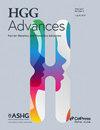Copy-number variants differ in frequency across genetic ancestry groups.
IF 3.3
Q2 GENETICS & HEREDITY
引用次数: 0
Abstract
Copy-number variants (CNVs) have been implicated in a variety of neuropsychiatric and cognitive phenotypes. We found that deleterious CNVs are less prevalent in non-European ancestry groups than they are in European ancestry groups of both the UK Biobank (UKBB) and a US replication cohort (SPARK). We also identified specific recurrent CNVs that consistently differ in frequency across ancestry groups in both the UKBB and SPARK. These ancestry-related differences in CNV prevalence present in both an unselected community population and a family cohort enriched with individuals diagnosed with autism spectrum disorder (ASD) strongly suggest that genetic ancestry should be considered when probing associations between CNVs and health outcomes.
不同基因祖先群体的拷贝数变异频率不同。
拷贝数变异(CNV)与多种神经精神和认知表型有关。我们发现,在英国生物库(UKBB)和美国复制队列(SPARK)中,有害 CNV 在非欧洲血统群体中的发生率低于欧洲血统群体。我们还发现了特定的复发性 CNV,这些 CNV 在英国生物库和 SPARK 的不同祖先群体中的频率一直存在差异。这些与祖先有关的 CNV 发生率差异同时存在于未经选择的社区人群和富含自闭症谱系障碍 (ASD) 患者的家族队列中,这有力地表明,在探究 CNV 与健康结果之间的关联时应考虑遗传祖先的因素。
本文章由计算机程序翻译,如有差异,请以英文原文为准。
求助全文
约1分钟内获得全文
求助全文
来源期刊

HGG Advances
Biochemistry, Genetics and Molecular Biology-Molecular Medicine
CiteScore
4.30
自引率
4.50%
发文量
69
审稿时长
14 weeks
 求助内容:
求助内容: 应助结果提醒方式:
应助结果提醒方式:


